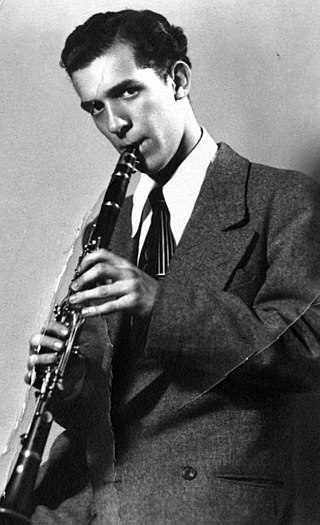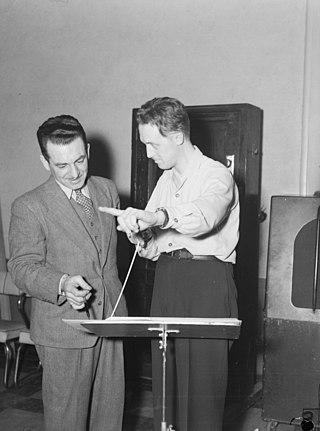Related Research Articles

Albert Antonio Serge Garant, was a Canadian composer, conductor, music critic, professor of music at the University of Montreal and radio host of Musique de notre siècle on Radio-Canada. In 1966, he with Jean Papineau-Couture, Maryvonne Kendergi, Wilfrid Pelletier and Hugh Davidson co-founded the Société de musique contemporaine du Québec. In 1979, he was made an Officer of the Order of Canada. The Prix Serge-Garant was created in his honor by the Fondation Émile Nelligan. Among his notable pupils were Ginette Bellavance, Walter Boudreau, Marcelle Deschênes, Denis Gougeon, Richard Grégoire, Anne Lauber, Michel Longtin, Myke Roy, and François Tousignant.

Henri-Pierre Sauguet-Poupard was a French composer.

Claude Champagne was a French Canadian composer, teacher, pianist, and violinist.
Clermont Pépin was a Canadian pianist, composer and teacher who lived in Quebec.
Costin Miereanu is a French composer and musicologist of Romanian birth.
The Conservatoire de musique du Québec à Montréal (CMQM) is a music conservatory located in Montreal, Quebec, Canada. In addition to the Montreal region, the school takes in students from nearby cities, including Granby, Joliette, St-Jean, Saint-Jérôme, Sherbrooke, and Salaberry-de-Valleyfield. The school is the first of nine conservatories in Quebec which form the Conservatoire de musique et d'art dramatique du Québec (CMADQ). The current director is Manon Lafrance. In addition to practice rooms, classrooms and rehearsal halls, the conservatory contains 85 teaching studios, a 225-seat theater, a concert hall of 225 seats, a recital hall with 100 places, and a large music multimedia center with a recording studio. The conservatoire is also home to a substantial musical library.
Marcel-François-Georges Delannoy was a French composer and critic. He wrote operas, ballets, orchestral works, vocal and chamber works, and film scores.
Joseph Masella was a Canadian french hornist and music educator.
Neil Chotem was a Canadian composer, arranger, conductor, pianist, and music educator.
José Evangelista was a Spanish composer and music educator who was based in Montreal, Canada. He was professor of composition at the Université de Montréal from 1979 to 2009. A member of the Canadian League of Composers, the Sociedad General de Autores y Editores, and an associate of the Canadian Music Centre, Evangelista was known for his commitment to contemporary classical music and non-Western music.

Jean Deslauriers was a Canadian conductor, violinist, and composer. As a conductor he had a long and fruitful partnership with the Canadian Broadcasting Corporation; conducting orchestras for feature films and television and radio programs for more than 40 years. He also worked as a guest conductor with orchestras and opera companies throughout Canada and served on the conducting staff of the Opéra du Québec. The Canadian Encyclopedia describes him as "a conductor with a sober but efficient technique, who was always faithful to the written score [and] equally at ease conducting concerts, opera, and lighter repertoire." His best-known compositions are his Prélude for strings and the song, La Musique des yeux. He is the father of soprano Yolande Deslauriers-Husaruk.
Yves Lapierre is a Canadian composer, arranger, record producer, and singer. He began his career performing and recording with the folk vocal quartet Les Cailloux during the 1960s. In the 1970s and 1980s he was highly active as a composer, arranger, and record producer for a large number of notable Canadian musicians. Some of his best known songs are Get That Ball, Tout va trop vite, Le Désamour, and Moi, de la tête aux pieds. He also composed music for several Canadian Broadcasting Corporation television dramas; including the Guy Fournier TV serials Jamais deux sans toi (1977–80) and L'Or et le papier (1988–89) and Lise Payette's La Bonne aventure.
Albert Chamberland was a Canadian violinist, composer, conductor, music producer, and music educator. As a violinist he performed as a chamber musician with a number of ensembles, including the Beethoven Trio with whom he made some early recordings for His Master's Voice (HMV) during the first decade of the 20th century. He also made some solo recordings for HMV and was a concert soloist. He performed with a variety of orchestras, serving as the Montreal Symphony Orchestra's first concertmaster. Chamberland also created several compositions for band and orchestra.
Georges-Émile Tanguay was a Canadian composer, organist, pianist, and music educator. An associate of the Canadian Music Centre, his compositional output is relatively small; consisting of 4 orchestral works, 4 chamber music pieces, 9 works for solo piano, 2 works for solo organ, and 4 choral works. The library at Université Laval holds many of his original manuscripts and his personal papers.
Georges Savaria was a Canadian pianist, composer, ondist, college administrator, and music educator. His compositional output consists of a 1951 piano concerto, several songs and works for solo piano, and music for theatre, television, and radio. Some of his music was published by the periodical Le Passe-Temps.
François Morel was a Canadian composer, pianist, conductor, and music educator. An associate of the Canadian Music Centre, he was made a Knight of the National Order of Quebec in 1994 and was awarded the Prix Denise-Pelletier in 1996. He has had his works premiered by the CBC Symphony Orchestra, the Montreal Symphony Orchestra, and the Philadelphia Orchestra.

Jean-Marie Beaudet was a Canadian conductor, organist, pianist, radio producer, and music educator. He had a long career with the Canadian Broadcasting Corporation, serving variously as a music producer, programing director, conductor, and administrator. With the CBC Symphony Orchestra he conducted the premiere recordings of works by many Canadian composers, including pieces by Maurice Blackburn, Claude Champagne, J.-J. Gagnier, Clermont Pépin, and Healey Willan.
Marc Bélanger is a Canadian violinist, violist, conductor, arranger, composer, and music educator.
Gerald Danovitch was a Canadian classical saxophone player and educator, McGill University professor, founder of Gerald Danovitch Saxophone Quartet and jazz studies department at McGill.
Arthur Romano was a Canadian saxophonist, clarinetist, oboist, english hornist, and music educator of Italian birth. He is considered a pioneer in the classical repertoire for the saxophone.
References
- ↑ "The legendary Michel Louvain visits hometown Thetford Mines". CBC Radio , October 5, 2012
- ↑ George Henry Hubert Lascelles Earl of Harewood (1965). Opera. Vol. 16. Rolls House Publishing Company. p. 755.
- ↑ Saxophone Journal. Vol. 14. Dorn Publications. 1989. pp. 14–15.
- 1 2 3 Michel Perrault, The Canadian Encyclopedia .
- ↑ "Music Of Michel Perrault 1956". Past Daily Weekend Gramophone, by Gordon Skene, December 27, 2015.
- ↑ John T. Saywell (1966). Canadian Annual Review of Politics and Public Affairs. University of Toronto Press. p. 513.
- ↑ The American Organist. Vol. 40. American Guild of Organists. 2006. p. 80.
- ↑ The Saxophone Symposium. Vol. 10–12. North American Saxophone Alliance. 1985. p. 28.
- ↑ "Four Nova Scotians among Order of Canada honourees". Chronicle Herald , July 1, 2015
- ↑ "Michel Louvain: le retour du gentleman". La Presse , 19 October 2015